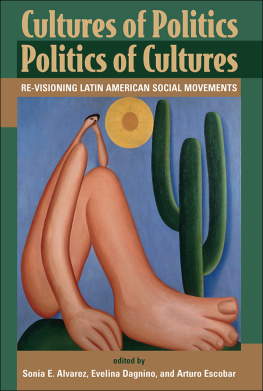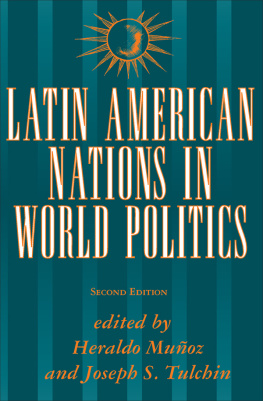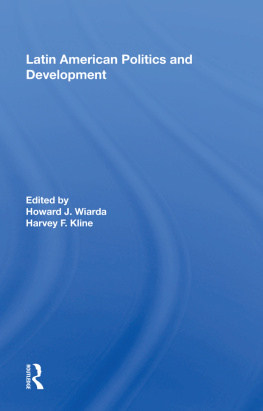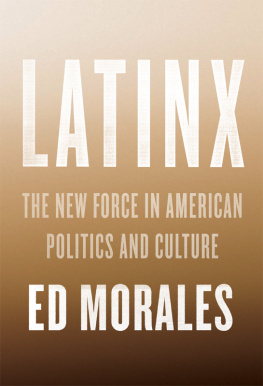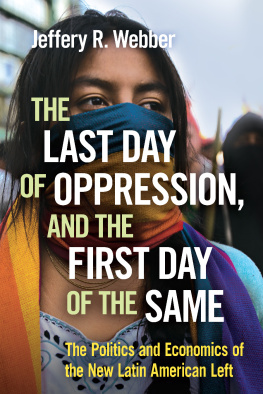First published 1998 by Westview Press
Published 2018 by Routledge
711 Third Avenue, New York, NY 10017, USA
2 Park Square, Milton Park, Abingdon, Oxon OX14 4RN
Routledge is an imprint of the Taylor & Francis Group, an informa business
Copyright 1998 Taylor Francis
All rights reserved. No part of this book may be reprinted or reproduced or utilised in any form or by any electronic, mechanical, or other means, now known or hereafter invented, including photocopying and recording, or in any information storage or retrieval system, without permission in writing from the publishers.
Notice:
Product or corporate names may be trademarks or registered trademarks, and are used only for identification and explanation without intent to infringe.
Library of Congress Cataloging-in-Publication Data
Cultures of politics/politics of cultures: re-visioning Latin American social movements / edited by Sonia E. Alvarez, Evelina Dagnino, Arturo Escobar.
p. cm.
Includes bibliographical references and index.
ISBN 0-8133-3071-8 (hardcover). ISBN 0-8133-3072-6 (paperback)
1. Social movementsLatin America. 2. Civil societyLatin America. 3. Political participationLatin America. 4. Political cultureLatin America. 5. MinoritiesLatin AmericaPolitical activity. I. Alvarez, Sonia E., 1956- . II. Dagnino, Evelina. III. Escobar, Arturo, 1952- .
HN110.5.A8C845 1998
303.484098dc2197-43513
CIP
ISBN 13: 978-0-8133-3072-3 (pbk)
This volume was originally inspired by the editors shared discomfort with the narrow disciplinary boundaries within which analyses of contemporary Latin American social movements are too often confined. Dissatisfied with the compartmentalized and segmented approaches prevailing in our own disciplines of anthropology and political science, we wanted to draw attention to how social movements operate at the interface of culture and politics. On the one hand, by exposing the perhaps less visible, less measurable, yet vital ways in which movements continue to contest culturally specific notions of politics and the political, we hoped to retheorize the cultural dimensions of politics and thereby contest the often-made claim that the political significance of social movements has receded with the return of formal, electoral democracy to much of Latin America. On the other hand, in underscoring how the cultural struggles of social movements over meanings and representations are deeply entangled with their struggles for rights and economic and political-institutional power, we wished to further theoretical reflection on the political dimensions of the cultural. By examining simultaneously the cultural in the political and the political in the cultural, we hoped to rekindle the dialogue between these two arenas and the various disciplines devoted to their study and thereby re-vision contemporary social movement practices.
The ensuing chapters are the outgrowth of multiple theoretical, disciplinary, political, personal, and transcontinental encountersentailing countless conversations, debates, conference sessions, seminars, and working meetings involving North American, European, and Latin American anthropologists, sociologists, literary critics, geologists, political scientists, and intellectual activists scattered across a vast array of locations in the Americas and around the globe. A product of genuinely transnational and transdisciplinary dialogue and collaboration, this book project spanned nearly four years and entailed a number of phases and processes.
Beginning in early 1994, the editors undertook extensive common readings in cultural and political theory, cultural studies, feminist theory, and other recent critical theoretical literatures in search of analytical guideposts around which to organize this collection. During 19941995, we came together in Atlanta, Rio de Janeiro, Campinas, Serra Negra, Florianpolis, and Washington, D.C., for several working sessions in which we refined the theoretical goals of the anthology, identified key contributors and themes, and reviewed chapter abstracts and preliminary drafts. We also wrote a preliminary introduction that attempted to map out the analytical terrain of the volume and circulated it to all contributors in August 1995.
Because we wanted to ensure the internal coherence and organicity of the volume, we engaged in ongoing dialogue with our contributors from the earliest stages of the project through its conclusion. To maximize debate and exchange among our contributing authors, the editors organized sessions at both the 1994 and 1995 international congresses of the Latin American Studies Association. We took a further, very important step toward that end by organizing a three-day working conferencefunded by the Rockefeller Foundation and the State University of Campinass Graduate Program in Social Sciencesat Campinas in March 1996. At that conference, all contributors presented a second draft of their chapters (circulated in advance to all conference participants) and received critical feedback from assigned discussants, editors, other contributors, and Brazilian colleagues and students present. We also invited four scholars whose work has been central to the study of social movements and cultural politicsAlberto Melucci, Elizabeth Jelin, Mary Louise Pratt, and Paulo Krischketo provide summary reflections on the draft chapters and conference proceedings. Their essays assessing the books theoretical and methodological contributions and signaling future research directions are assembled in Part Four of this volume.
After the conference, the editors and a few contributors stayed on in Campinas to revise and refine the arguments advanced in our draft introduction in light of conference debates and to provide detailed editorial feedback to each contributor. Chapter authors were encouraged to address the conceptual and theoretical issues raised by other contributors in their final revisions. After receiving these revisions in July and August 1996, the editors redrafted the introduction to reflect the final chapter arguments.
We of course incurred many debts of gratitude over the course of the numerous phases of this project. We are especially grateful to all our contributors for their hard work, perseverance, and assiduous enthusiasm and support for this collaborative undertaking. We also thank our Brazilian colleaguesAna Maria Doimo, Antonio Augusto Arantes, Bela Feldman-Bianco, Caio Navarro Toledo, Claudia Lima Costa, Renato Ortiz, Suely Kofes, and Teresa Caldeirawho served as session coordinators and discussants at the 1996 Campinas conference and whose critical insights greatly enriched this collection. Ana Claudia Chaves Teixeira adeptly coordinated the often complex logistical arrangements for our international conference, juggling complicated travel schedules and catering to the every need of our contributors and other conference participants with extraordinary efficiency and invariable good humor. Suely Borges Costa, Janaina Damasceno, Luis Celso Machado, and the administrative staff of the Institute of Philosophy and Human Sciences also provided invaluable support in organizing the Campinas conference. We also thank the Graduate Program in Social Sciences at Campinas and the Rockefeller Foundations Humanities Fellowships Program (through a 19951998 grant to the Culture and Politics Area of the interdisciplinary Ph.D. Program in Social Sciences, coordinated by Evelina Dagnino during 19951996) for their financial support of the conference.
Anne Blair ably translated the chapters authored by Srgio Baierle and coauthored by Maria Celia Paoli and Vera Telles, and Brian Wampler was responsible for translating Olivia Gomes da Cunhas contribution (both translators were assisted by Sonia E. Alvarez). Arturo Escobar translated the chapter he coauthored with Carlos Rosero and Libia Grueso. Henrietta Brown, Cheryl Van Der Veer, and other staff at the University of California at Santa Cruz Document Publishing and Editing Center provided inestimable assistance with the preparation of the electronic manuscript. We also wish to thank Mr. Eduardo Costantini for generously granting us permission to use the Abaporu as the cover to this volume.

